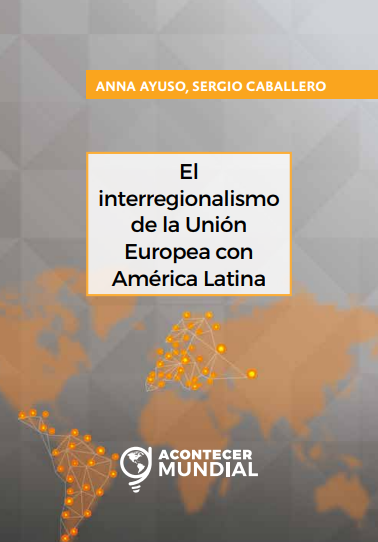El interregionalismo de la Unión Europea (UE) con América Latina
Este volumen analiza las relaciones entre la Unión Europea y América Latina y el Caribe desde el regionalismo y el interregionalismo, en cuanto fenómenos estructurantes del proceso de globalización. Así, en el capítulo primero se revisan las teorías regionalistas a lo largo de seis décadas a partir de las teorías clásicas funcionalistas, se revisa el regionalismo abierto de corte estructuralista y se termina con en el regionalismo del siglo xxi, el cual abarca una pluralidad de experiencias heterogéneas.
Autores/as
-
Introducción
-
El regionalismo en la era de la globalización
-
El interregionalismo y el caso UE-ALC : del federador externo a la geometría variable
-
El interregionalismo complejo de la ue con ALC en sus diferentes dimensiones
-
Interregionalismo entre la UE y ALC en la globalización : sinergias y “desacompasamientos”
-
Reflexiones finales : interregionalismo asimétrico y geometría variable
Acharya, A. (2012, marzo). Comparative regionalism: a field whose time has come? The International Spectator, 47(1), 3-15.
Adler, E. y Barnett, M. (1998). Security communities. Cambridge: Uni-versity Press.
Alemany, C. (2007). Mecanismos de diálogo Unión Europea-América Latina. En C. Freres et al. (Eds.), ¿Sirve el diálogo político entre la ue y América Latina? (pp. 43-62). Madrid: Cealci, Fundación Carolina.
Alonso, J. A. (2010). Hacia una nueva estrategia ue -América Latina: notas para el debate. En Foro Eurolatinoamericano de Centros de
Análisis. “Diálogo ue - alc . Debate y conclusiones” (pp. 89-103). Madrid: Fundación Carolina.
Altmann, J., F., Rojas-Aravena, E. y Beirute, T. (Eds.). (2011). América Latina y el Caribe: ¿integrados o marginados? Argentina: Flacso.
Ayllon, B. (Ed.). (2016). ¿Latinoamérica dividida? Procesos de integración y cooperación Sur-Sur (1.a ed.). Quito: Editorial iaen (Instituto de AltosEstudios Nacionales).
Ayllón, B., Ojeda, T. y Surasky, J. (Coord.). (2014). Cooperación Sur-Sur. Regionalismo e integración en América Latina. Madrid: Ed. Los libros de la Catarata, iudc - ucm .
Ayuso, A. (2009, mayo). Encuentros y desencuentros de la asociación estratégica eurolatinoamericana: equilibrios y asimetrías. Revista Cidob Afers Internacionals, (85-86), 185-19.
Ayuso, A. (2009). Estudio de viabilidad sobre el Acuerdo de Asociación Global Interregional para la creación de una zona de Asociación Global. Bruselas: Comisión de Exteriores del Parlamento Europeo.
Ayuso, A. (2012). Institucionalidad jurídica y tratamiento de las asimetrías: viejos y nuevos retos de la integración latinoamericana. En F. Rojas Aravena (Ed.), Vínculos globales en un contexto multilateral complejo (pp. 375-422). Buenos Aires: Flacso, Secretaría-General-
Aecid-Cidob, Buenos Aires: Teseo/Flacso.
Ayuso, A. (2016). Bilateralismo, interregionalismo y enfoque global: dilemas de la ue frente a América Latina y el Caribe. En G. Molano
(Comp.), La Unión Europea en América Latina y el Caribe. Lógicas y políticas de un actor global (pp. 101-131). Bogotá: Universidad Sergio Arboleda.
Ayuso, A., Mattheis F. y Viilup, E. (2015). Regional cooperation, interregionalism and governance in the Atlantic. En J. Bacaria y L. Tarragona (Eds.), Atlantic Future shaping a new hemisphere for the 21st century: Africa, Europe and the Americas (pp. 117-135). Barcelona: Cidob.
Ayuso, A. y Foglia, M. (2010, junio). Tensiones entre regionalismo y bilateralismo en las negociaciones de los acuerdos de asociación estratégica ue - alc . Revista Aportes para la Integración Latinoamericana, xvi (22), 43-84.
Ayuso, A. y Gardini, G. L. (2017). eu -Latin American relations as a template for interregionalism. En F. Mattheis y A. Godsäter (Eds.), Interregionalism across the Atlantic Space (pp. 115-130). Londres: Springer International Publishing.
Ayuso, A. y Gratius, S. (2016). América Latina y Europa: ¿repetir o reinventar un ciclo? Revista Pensamiento Propio, (44), 249-292.
Ayuso, A. y Gratius, S. (2015, julio-agosto). ¿Qué quiere América Latina de Europa? Política Exterior, (166), 130-137.
Ayuso, A. y Gratius, S. (2017). ¿Nadar a contracorriente? El futuro del acuerdo de la Unión Europea con Cuba. En A. Ayuso y S. Gratius
(Coord.), Nueva etapa entre Cuba y la ue . Escenarios de futuro (pp. 89-104). Barcelona: Cidob.
Bacaria, J. y Valle, V. (Coord.). (2015, septiembre). Introducción, Relaciones Interregionales: Transeuroasiáticas. Revista D’Afers Internacional, 110, 7-16.
Baert, F., Scaramagli, T. y Söderbaum, F. (Eds.). (2014). Intersecting interregionalism: regions, global governance and the eu . Dordrecht: Springer.
Börzel, T. A. (2013). Comparative regionalism: European integration and beyond. En T. Carlsnaes, T. Risse y B. A. Simmons (Eds.), Handbook of international Relations (2. a ed., pp. 503-531). Londres: sage .
Börzel, T. y Risse, T. (2009). Diffusing (inter-) regionalism. The eu as a model of regional integration. Documento de trabajo de la KFG Series.
Caballero, S. (2011). Brasil y la región: una potencia emergente y la integración regional sudamericana. Revista Brasileira de Política Internacional, 54(2), 158-172.
Caballero, S. (2016). El Brasil de Dilma, ¿alejándose del regionalismo postliberal? Ponencia presentada en Congreso Ceisal, Salamanca, 28 de junio.
Caballero, S. (2017a). El desafío del mega-regionalismo: el multilateralismo en cuestión. Pensamiento Propio. América Latina: de la bonanza a la crisis de la globalización, (44), 77-105.
Caballero, S. (2017b, enero-junio). El papel de México en la megarregión transpacífica: bisagra entre América y Asia-Pacífico. Aldea Mundo, Revista sobre Fronteras e Integración, 22(43), 7-17.
Cardona, G. (2015). La Organización Mundial del Comercio y los tlc , ¿reinventando el sistema mundial de comercio? Serie Investigaciones Ceipa. Cerny, P. (2010). Rethinking world politics. Oxford: Oxford University Press.
Collard-Wexler, S. (2006). Integration under anarchy: neorealism and the European Union. European Journal of International Relations, (12). issue: 3, 397-432.
Comisión Europea. (2009). La Unión Europea y América Latina: una asociación de actores globales. Bruselas: com.
Cooper, R., Hughes, C. y De Lombaerde, P. (Eds.). (2008). Regionalisation and global governance. The taming of globalisation? Londres, Nueva York: Routledge.
Cox, R. (1996). Approaches to world order. Cambridge University Press. Dabène, O. (2009). The politics of regional integration in Latin America. Theoretical and comparative explorations. Londres: Palgrave McMillan.
De Lombaerde, P., Söderbaum, F., van Langenhove, L. y Baert, F. (2009, abril). The problem of comparison in comparative regionalism.
JeanMonnet/Robert Schuman Paper Series, 9(7), 22.
De Lombaerde, P., Söderbaum, F. y Wunderlich, J.-U. (2015). Interregionalism. En A. Jorgensen y T. Drieskens, The sage handbook
of European foreign policy (Vol. 2, pp 750-765). Londres: sage.
Deustsch, K. (1974). Análisis de las relaciones internacionales. Buenos Aires: Paidós.
Doidge, M. (2014). Interregionalism and the European Union: conceptualizing group-to-group relations. En F. Baert, T. Scaramagli y F.
Söderbaum (eds.), Intersecting interregionalism: regions, global governance and the eu (pp. 37-54). Dordrecht: Springer.
European Union Global Strategy- eeas . (2016, junio). Shared vision, common action: a stronger Europe. Recuperado de https://eeas.europa.eu/archives/docs/ top_stories/pdf/eugs_review_web.pdf
Gardini, G. y Malamud, A. (2014). Debunking interregionalism: concepts, types and critique–with a transatlantic focus. Documento de trabajo N.o 38. Atlantic Future, Barcelona.
Gardini, G. y Ayuso, A. (2015). eu -Latin America and Caribbean inter-regional relations: complexity and change. Documento de Atlantic Future Scientific, N. o 24.
Garzón, J. F. (2015, enero). Mulipolarity and the future of regionalism: Latin America and beyond. Documento de trabajo giga N.o 264.
Gratius, S. (2011). The eu and the “special ten”: deepening or widening Strategic Partnerships? Policy Brief, (76), 2011. Madrid, FRIDE.
Gratius, S. (2008, mayo). La Cumbre Europeo-Latinoamericana: ¿hacia un bilateralismo selectivo? Madrid: FRIDE.
Haas, E. (2004). The uniting of Europe. ee . uu .: University of Notre Dame.
Hardacre, A. y Smith, M. (2009). The eu and the diplomacy of complex interregionalism. The Hague Journal of Diplomacy, (4), 167-188.
Hänggi, H. (2000). Interregionalism: empirical and theoretical perspectives. Documento elaborado para el workshop “Dollars, democracy and trade: external influence on economic integration in the Americas”, Los Angeles, ca , mayo 18 del 2000.
Hänggi, H. (2006). Interregionalism as a multifaceted phenomenon. In search of a typology. En J. Rüland, H. Hänggi y R. Roloff, Interregionalism and international relations. (pp. 31-32). Londres, Nueva York: Routledge.
Hermann, C. (2014). Crisis, structural reform and the dismantling of the European Social Model(s). Economic and Industrial Democracy, 38(1), 51-68.
Hettne, B. (1991, agosto). Security and peace in post-cold war Europe. Journal of Peace Research, 28 (3), 279-294.
Hettne, B. (2003). The new regionalism revisited. En F. Söderbaum y T. Shaw (Eds.), Theories of new regionalism (pp. 22-42). Londres:
Palgrave Macmillan.
Hurrell, A. (1992, enero). Latin America in the new world order: a regional bloc of the Americas? International Affairs, 68(1) pp. 121-139.
Hurrell, A. (1995). Regionalism in theoretical perspective. En L. Fawcett y A. Hurrell, Regionalism in world politics: Regional organization and international order (pp. 37-73). Oxford University Press.
Ibañez, J. (2000). El nuevo regionalismo latinoamericano en los años noventa. Revista Electrónica de Estudios Internacionales, (1), 1-11.
Kacef, O. (2016). Oportunidades y desafíos en las relaciones entre América Latina y Asia. Revista Cidob d’Afers Internacionals, 114, 41-62.
Litsegård, A. y F. Mattheis. (2018). The Atlantic space-a region in the making. En F. Mattheis y A. Godsäter (Eds.), Interregionalism across the Atlantic space (pp. 1-13). Netherlands: Springer International Publishing.
Malamud, A. y Gardini, G. (2012). Has regionalism peaked? The Latin American quagmire and its lessons. The International Spectator: Italian Journal of International Affairs, 47(1), 116-133.
Malamud, A. (2010). Latin American regionalism and European Integration, 32(6), 637-657. eu Studies.
Malamud, A. (2011). A leader without followers? The growing divergence between the regional and global performance of Brazilian foreign policy. Latin American Politics and Society, 53(3), 1-24.
Malamud A. y. Schmitter. P. C. (2007). The experience of European integration and the potential for integration in South America. Barcelona: Cidob.
Malamud, C. (Coord.). (2017, diciembre). ¿Por qué importa América Latina? (Informe Elcano 22). Madrid: Real Instituto Elcano.
Manrique, M. y Lerch, M. (2015). The ttip ’s potential impact on developing countries: a review of existing literature and selected issues. Bruselas: Parlamento Europeo.
Mariscal, N. (2003). Teorías políticas de la integración europea. Madrid: Tecnos.
Mattheis, F. y Godsäter, A. (Eds.). (2018). Interregionalism across the Atlantic Space. S.l.: Springer.
Mattli, W. (1999). The logic of regional integration: Europe and beyond. Cambridge University Press.
Meissner, K. L. (2017). Leveraging interregionalism: eu strategic interests in Asia, Latin America and the Gulf region. International Politics. Macmillan Publishers.
Mellado, N. (2010). La Unión Europea y la integración sudamericana: espacio político birregional. En M. Cienfuegos y J. A. Sanahuja, Una región en construcción. Unasur y la Integración de América del Sur (pp. 351-388). Barcelona: Cidob.
Mitrany, D. (1948, julio). The functional approach to world organization. International Affairs, 24(3), 350-363.
Molano, G. (2017). La construcción de un mundo de regiones. Revista de Estudios Sociales, (61), 14-27.
Moravcsik, A. (1998). The choice for Europe. Social purpose & state power from Messina to Maastricht. Ithaca: Cornell University.
Motta Veiga, P. y Ríos, S. (2007). O regionalismo pós-liberal na América do Sul: origens, iniciativas e dilemas. Santiago de Chile: Cepal.
Nolte, D. (2013). Latin America’s new regional architecture: segmented regionalism or cooperative regional governance? Documento presentado en el xxxi International Congress of the Latin American Studies Association ( lasa ), Washington d . c ., mayo junio del 2013.
Nolte, D. (2016a). Regional governance from a comparative perspective. En V. M. González-Sanchéz, (Ed.). Economy, Politics and Governance Challenges (pp. 1-16). Nueva York: Nova Science Publishers.
Nolte, D. (2016b, agosto). The Pacific Alliance: nation-branding through regional organisations. giga Focus, (4), 1-13.
Nolte, D. y V. M. Mijares. (2018, abril 23). La crisis de Unasur y la deconstrucción de Sudamerica. El Espectador.
Nugent, N. (1989). The government and politics of the European Union. Nueva York: Palgrave.
Pollio, E. (2010). What kind of interregionalism? The eu -Mercosur relationship within the emerging ‘Transatlantic Triangle’? En Bruges Regional Integration and Global Governance Papers, 3/2010. un - cris . pp. 30
Puig, J. C. (1986, enero-febrero). Integración y autonomía de América Latina en la Postrimerías del s. xx . Revista Integración Latinoamericana, 109, 40-62.
Quiliconi, C. (2016). Latin America integration: regionalism a la carte in a multipolar world. Colombia Internacional, 92, 15-41.
Riggirozzi, P. (2012). Region, regionness and regionalism in Latin America: towards a new synthesis. New Political Economy, 17(4), 421-443. Riggirozzi, P. y Tussie, D. (2012). The rise of post-hegemonic regionalism: the case of Latin America. Londres: Springer.
Rivarola, A. y Briceño-Ruiz, J. (Eds.). (2013). Resilience of regionalism in Latin America and the Caribbean. Londres: Palgrave Macmillan.
Rojas Aravena, F. (2012). Diplomacia de cumbres. El difícil camino hacia un multilateralismo cooperativo, proactivo y eficaz. Buenos Aires: Flacso.
Rosales, O. y Herreros, S. (2014). Mega-regional trade negotiations: what is at stake for Latin America? Documento de trabajo Inter-American Dialogue, enero, Washington.
Sanahuja, J. A. (2007). Regionalismo e integración en América Latina: balance y perspectivas. Revista Pensamiento Iberoamericano, 0, 75-106.
Sanahuja, J. A. (2010). La Construcción de una región: Sudamérica y el regionalismo posliberal. En M. Cienfuegos y J. A. Sanahuja (Eds.). Una región en construcción: Unasur y la integración en América del Sur. Barcelona: Bellaterra/Fundación Cidob, 87-134.
Sanahuja, J. A. (Ed.). (2016, julio-diciembre). América Latina: de la bonanza a la crisis de la globalización. Revista Pensamiento Propio, 44, 13-25.
Sandholtz, W. y Stone Sweet, A. (Eds.). (1998). European integration and supranational governance. Londres: Oxford University Press.
Sandholtz, W. y Zysman, J. (1994). 1992: Recasting the European bargain. En F. Nelsen-Brent y A. Stubb (Eds.). The European Union.
Readings on the Theory and Practice of European Integration. Londres: Lynne Rienner Publishers.
Sberro, S. (2015). La negociación del ttip : del interregionalismo a la gobernanza Global. Revista Cidob d’Afers Internacionals, 110, 67-86.
Serban, I. (2015). The European Union foreign policy from pure to complex interregionalismo. The case of Latin America and the role of transregionalism. Documento presentado en isa , Nueva Orleans, 2015.
Söderbaum, F. (2015). Early, old, new and comparative regionalism: the scholarly development of the field. Documento de trabajo kfg N.o 64, octubre del 2015, Freie Universität Berlin.
Teló, M. (2001). Globalisation, new regionalism and the role of European Union. En European Union and new regionalism (pp. 1-20). Aldershot (Great Britain): Ashgate.
Teló, M. (2007). European Union and new regionalism: regional actors and global governance in a post-hegemonic era. 2. a ed. Great Britain: Ashgate Publishing Company.
The Economist. (2016, julio 30). The New Political Divide. Economist. com. Recuperado de http://www.economist.com/news/leaders/21702750-farewell-left-versus-right-contest-matters-now-open-against-closed-new (último acceso 21 de febrero de 2018).
Tussie, D. (2009). Latin America: Contrasting motivations for regional projects. Review of International Studies, 35(1), 169-188.
Van Klaveren, A. (2017). Regionalism in Latin América. Navigating in the fog. Documento de trabajo seco / wti N.o 25, diciembre.
Van Klaveren, A. (2012). América Latina en un nuevo mundo. Revista Cidob d’Afers Internacionals, 100, 131-150.
Van Langenhoven, L. (2010). The eu as a global actor in a multipolar world and multilateral 2.0 Environment. Documentode trabajo Egmont.
Vieira Posada, E. (2008). La formación de espacios regionales en la integración de América Latina. Bogotá: Pontificia Universidad Javeriana.
Eaque ipsa quae ab illo inventore veritatis et quasi architecto beatae vitae dicta sunt explicabo.
Detalles sobre esta monografía

Esta obra está bajo una licencia internacional Creative Commons Atribución-NoComercial-SinDerivadas 4.0.
Almétricas







